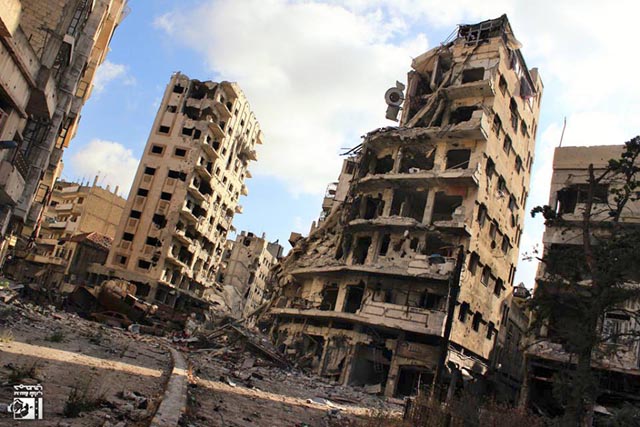BEIRUT — New claims have emerged that President Bashar Assad’s regime may have launched attacks with an industrial chemical earlier this month, despite an international agreement to eliminate Syria’s chemical arsenal.
The latest evidence, cited by the United States and France, comes as Syria plans to hold a June 3 presidential poll, which the United Nations and the Arab League condemned as a blow to efforts to end the three-year-old civil war.
“We have indications of the use of a toxic industrial chemical, probably chlorine, in Syria this month, in the opposition-dominated village of Kafr Zita,” White House spokesman Jay Carney said Monday.
“We are examining allegations that the government was responsible.”
The revelation follows a Sunday announcement by President Francois Hollande that France had “information” — but no proof — that Assad’s regime was still using chemical weapons.
There have been conflicting accounts of the alleged chlorine attack in Kafr Zita, a rebel-held village in central Hama province, with the government and the opposition trading blame.
Activists have also reported other chlorine gas attacks, most recently in Idlib province, in the northwest, on Monday.
The Organisation for the Prohibition of Chemical Weapons and other experts have spent months working to remove Syria’s chemical stockpiles, under an agreement reached after gas attacks killed hundreds near Damascus last August.
Western governments blamed those attacks on the Assad regime and the United States threatened military action before backing down and reaching a deal with Russia to eliminate the chemical weapons.
The OPCW said last week that 65 per cent of Syria’s declared arsenal has been removed from the country.
Although chlorine is a toxic chemical, it is widely used for commercial and domestic purposes, so Syria was not required to declare its stockpiles to the OPCW, a chemical weapons expert told AFP.
“However, as a chemical weapon it is prohibited under the Chemical Weapons Convention,” which Syria joined last year, said Hamish de Bretton-Gordon, CEO of SecureBio, a British chemical weapons consultancy.
“The delivery method that we’ve seen — the use of helicopters — I am certain the opposition don’t have any helicopters.”
He also said that although chlorine is a weak agent, chemical weapons are “very effective in this kind of warfare, in urban, built-up areas, as chemical weapons find their ways into the nooks and crannies.”
Syria, meanwhile, announced on Monday that it will hold a June 3 presidential election, expected to return Assad to office.
Syria’s first presidential election — after constitutional amendments scrapped a referendum system — is to go ahead despite violence which has killed more than 150,000 people since March 2011.
Candidates have until May 1 to register and Syrians living abroad will vote on May 28.
The United Nations and the Arab League condemned the announcement, warning it would torpedo efforts to broker a negotiated peace.
“Such elections are incompatible with the letter and spirit of the Geneva communique,” UN spokesman Stephane Dujarric said, referring to a 2012 agreement on a transition to democracy.
Arab League chief Nabil Al Arabi agreed, adding: “From a practical point of view it is not possible to organise transparent, democratic and credible presidential election amid the harsh human tragedy.”
The International Committee of the Red Cross said it was “appalled” by escalating violence in the main northern city of Aleppo, “where parties have in recent days carried out indiscriminate attacks against civilians.”
In recent weeks, government aircraft have stepped up strikes against rebel-held areas in the east of the city, pressing a bombing campaign that has killed hundreds of people since December.
Rebel fighters have hit back with rocket attacks against government-held districts in the west of the city.
In the central city of Homs, once dubbed “the capital of the revolution” against Assad, the air force bombed a tiny rebel held enclave in the city centre, activists said.
